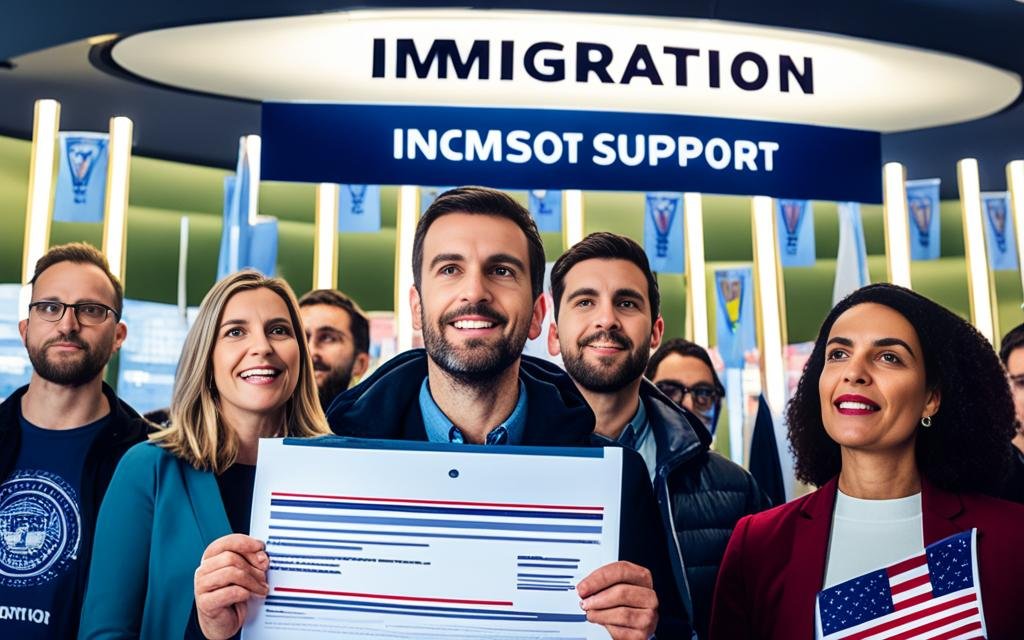As an experienced journalist specializing in immigration affairs, I understand the complexities and challenges individuals face when navigating immigration laws. Moving to a new country or seeking to immigrate entails legal transitions and requires a thorough understanding of immigration policies and regulations.
In this comprehensive guide to immigration laws, I aim to bridge cultures and provide you with essential knowledge to navigate the intricate landscape of immigration. Whether you are an individual looking to start a new life or a family seeking to reunite, this guide will equip you with the necessary information and resources to ensure a smooth legal transition.
From understanding the complexity of immigration policy to exploring the visa application journey, we will cover a range of topics that are crucial for anyone navigating the immigration process. We will delve into the requirements for U.S. citizenship, explore the pathways to obtaining a green card, and discuss the importance of staying informed about immigration law updates.
Throughout this guide, I will emphasize the significance of cultural insight and the role it plays in legal success. Understanding the cultural nuances inherent in immigration laws is essential for both individuals and legal professionals in achieving favorable outcomes. I will also highlight the importance of seeking legal assistance when navigating immigration laws, ensuring that you have the guidance you need every step of the way.
Join me as we embark on this journey of understanding and navigating immigration laws. Together, we will bridge cultures and empower individuals to navigate the complexities of immigration policies, fostering inclusive and thriving communities.
Key Takeaways:
- Immigration laws are complex and require a thorough understanding to navigate successfully.
- This guide provides comprehensive information and resources to help individuals navigate the immigration process.
- Cultural insight plays a vital role in legal success when dealing with immigration matters.
- Seeking legal assistance can greatly enhance the chances of a smooth and successful immigration journey.
- Staying informed about changes in immigration policies is crucial for individuals navigating the immigration process.
Understanding the Complexity of Immigration Policy
In the field of immigration, navigating the vast landscape of policies and regulations requires a thorough understanding of the complex legal framework. Immigration policy encompasses a myriad of regulations and laws that govern the entry, stay, and citizenship processes for individuals moving to a new country.
Understanding the nuances and intricacies of immigration policy is pivotal for anyone embarking on an international relocation or seeking to immigrate permanently. Without adequate knowledge of the legal requirements and procedures, individuals may find themselves facing challenges and delays in their journey towards lawful immigration status.
To successfully navigate the complexities of immigration policy, seeking legal guidance is crucial. Experienced immigration lawyers provide the expertise and knowledge needed to interpret and apply the often intricate laws and regulations. They can offer personalized advice, clarify legal requirements, and guide individuals through the complicated process, ensuring compliance and increasing the chances of a successful immigration outcome.
By working with knowledgeable legal professionals, individuals can obtain the necessary support to navigate the ever-changing landscape of immigration regulations. Legal guidance is fundamental in avoiding mistakes that could jeopardize immigration prospects and helps individuals make informed decisions based on the most up-to-date policies.
Immigration policy is a constantly evolving field, with regulations being updated and revised regularly. Therefore, staying informed about changes and updates is essential for individuals navigating the immigration process. By keeping abreast of these policy changes, individuals can adapt their strategies and stay on the right path towards achieving their immigration goals.
Navigating Immigration Laws
In order to successfully navigate the complexities of immigration laws, it is crucial to have a solid understanding of the basics. Whether you are planning to move abroad or seeking to immigrate to a new country, knowing the fundamental aspects of immigration law is essential for a smooth transition.
Essential Overview of Immigration Law Basics
An overview of immigration law basics provides a foundation for individuals embarking on the immigration process. This includes understanding different types of visas, eligibility criteria, required documentation, and the legal procedures involved in immigrating to a new country. It is important to fully comprehend the legal requirements and processes to ensure compliance and a successful outcome.
Legal Assistance for Immigration Needs
Seeking legal assistance is crucial when it comes to immigration matters. Professional immigration lawyers provide valuable guidance and support throughout the entire process. They offer consultations to assess individual situations, assist in document preparation, and represent clients in immigration proceedings. With their expertise and knowledge, immigration lawyers can navigate the complex immigration laws and help individuals achieve their immigration goals.

The Role of Cultural Insight in Legal Success
Cultural insight plays a significant role in achieving legal success in immigration matters. Understanding the nuances of immigration laws and procedures, especially when working with individuals from diverse cultural backgrounds, requires cultural competence. By seeking multicultural legal advice, individuals can benefit from the ability to navigate cultural differences effectively, ensuring a smooth and successful legal process.
| Benefits of Understanding Immigration Law Basics | Benefits of Legal Assistance | Benefits of Cultural Insight in Legal Success |
|---|---|---|
| 1. Ensures compliance with legal requirements | 1. Professional guidance throughout the process | 1. Navigating cultural differences effectively |
| 2. Helps individuals make informed decisions | 2. Assists with document preparation and submissions | 2. Enhancing communication and understanding |
| 3. Increases chances of successful outcomes | 3. Representation in immigration proceedings | 3. Building trust and rapport with diverse communities |
The Visa Application Journey
Embarking on the journey of applying for a visa can be an exciting yet complex process. Understanding the visa application process, requirements, and different visa types is essential for a successful application. This section provides a step-by-step guide to help you navigate the visa application journey.
Step 1: Determine Visa Requirements
Before starting the application process, it’s crucial to identify the specific visa requirements for your destination country. Each country has its own visa categories and eligibility criteria. Research the visa types available and determine which one suits your purpose of travel, such as tourist visa, student visa, work visa, or business visa.
Step 2: Gather Required Documentation
Once you have determined the appropriate visa type, it’s time to gather the required documentation. Common documents include a valid passport, proof of financial stability, travel itinerary, proof of accommodation, educational certificates (for student visas), and employment letters (for work visas). It’s essential to carefully review the specific requirements for your chosen visa category.
Step 3: Submit Online Application
Many countries now offer online visa application platforms, making the process more convenient. Fill out the application form accurately and provide all the requested information. Attach the required documentation as per the instructions provided. Double-check your application before submitting to ensure accuracy.
Step 4: Pay Visa Fees
Most visa applications require payment of processing fees. Familiarize yourself with the visa fees and any additional charges, such as biometric fees or courier fees. Ensure that you make the payment using the approved methods and keep the receipt as proof.
Step 5: Attend Biometrics Appointment (If Required)
Some countries may require applicants to attend a biometrics appointment to provide fingerprints and a photograph. Follow the instructions provided and schedule an appointment at the designated visa application center. Attend the appointment on the scheduled date and time to complete this step.
Step 6: Attend Visa Interview (If Required)
In certain cases, applicants may need to attend a visa interview at the embassy or consulate. Prepare thoroughly by reviewing your application, knowing the purpose of your visit, and being able to answer any questions the consular officer may have. Dress professionally and arrive on time for the interview.
Step 7: Wait for Application Processing
After submitting your application, the processing time can vary. It’s essential to be patient and allow the embassy or consulate sufficient time to review and process your application. Avoid making unnecessary inquiries that may delay the process.
Step 8: Receive Visa Decision
Once the visa application has been processed, you will receive a decision on your visa. If approved, follow the instructions for collecting your visa. If your application is denied, you may have the option to appeal the decision or reapply, depending on the specific circumstances.
Step 9: Plan Your Travel
With your visa in hand, you can now plan your travel arrangements. Book flights, accommodations, and any other necessary arrangements. Ensure that you have a clear understanding of the visa’s validity, entry requirements, and any restrictions or conditions associated with it.
Successfully navigating the visa application journey requires thorough research, careful preparation, and adherence to the specific requirements of your chosen visa type. By following these steps and staying organized throughout the process, you can increase your chances of obtaining the visa you need for your desired destination.
Legal Pathways to U.S. Citizenship
In this section, I will provide a comprehensive overview of the legal pathways to U.S. citizenship. Understanding the naturalization process, requirements for eligibility, and the necessary supporting documentation is crucial for individuals seeking to become U.S. citizens. Additionally, I will offer guidance on preparing for the citizenship test and interview to ensure a successful naturalization journey.
Understanding the Naturalization Process
The naturalization process is the legal means through which individuals become U.S. citizens. It involves several steps, including the submission of a citizenship application, meeting specific eligibility criteria, and attending a naturalization interview and test. By understanding the naturalization process, applicants can navigate each stage effectively and increase their chances of obtaining U.S. citizenship.
Requirements for Eligibility and Supporting Documentation
To become eligible for U.S. citizenship, applicants must meet certain requirements set by U.S. immigration laws. These requirements include demonstrating good moral character, satisfying residency and physical presence requirements, and possessing the ability to read, write, and speak English. Additionally, supporting documents such as proof of residency, tax records, and character references are essential to establish eligibility for U.S. citizenship.
Preparation for the Citizenship Test and Interview
Preparing for the citizenship test and interview is vital for a successful naturalization process. The citizenship test assesses applicants’ knowledge of U.S. civics, including topics such as U.S. history, government, and rights and responsibilities. Adequate preparation through study materials, practice tests, and civic education programs can help applicants feel confident and perform well on the test. Additionally, knowing what to expect during the citizenship interview and being prepared to answer questions about an applicant’s background and application can contribute to a positive outcome.

By understanding the naturalization process, meeting the eligibility requirements, and adequately preparing for the citizenship test and interview, individuals can navigate the legal pathways to U.S. citizenship. Obtaining U.S. citizenship opens doors to new opportunities and grants individuals the rights and privileges that come with being a U.S. citizen.
Green Card Requirements Explored
In order to obtain permanent residency in the United States, also known as a green card, individuals must meet specific requirements outlined by the U.S. government. This section explores the different qualifying categories for obtaining a green card and provides valuable insights into the eligibility criteria and application process.
Qualifying Categories for Permanent Residency
There are various pathways to securing a green card, each tailored to different circumstances and goals. The qualifying categories for permanent residency include:
- Family-Based Immigration: This category allows certain family members of U.S. citizens or permanent residents to apply for a green card. Immediate relatives, such as spouses, parents, and unmarried children under 21 years old, have priority in this category. Preference categories are also available for other qualifying relatives, with varying levels of priority.
- Employment-Based Immigration: This category is for individuals seeking to immigrate to the U.S. based on employment opportunities. It includes immigrant workers in specific fields, such as professionals with advanced degrees, skilled workers, and unskilled workers. Investors and entrepreneurs may also qualify under certain conditions.
Understanding the qualifying categories is crucial to determine the most appropriate path to permanent residency.
Navigating Family and Employment-Based Paths
Once the qualifying category is identified, navigating the family-based or employment-based path requires careful attention to detail. The application process involves several steps, documentation requirements, and potential challenges. Here is an overview of what to expect:
- Filing the Petition: In family-based immigration, the U.S. citizen or permanent resident family member typically serves as the petitioner, filing the appropriate form with U.S. Citizenship and Immigration Services (USCIS). In employment-based immigration, the sponsoring employer initiates the process by obtaining labor certification or filing a petition.
- Documentary Evidence: Gathering and submitting the necessary supporting documentation is a critical step in the application process. This may include birth certificates, marriage certificates, proof of employment or investment, and other relevant documents to establish eligibility.
- Application Submission: Once the petition and supporting documents are compiled, they must be submitted to USCIS for review. The application must be completed accurately and accompanied by the appropriate filing fees.
- USCIS Interviews and Reviews: Depending on the category and individual circumstances, USCIS may schedule an interview or request additional evidence to assess an applicant’s eligibility for a green card. It is essential to prepare thoroughly for any interviews or reviews.
- Decision and Next Steps: After reviewing the application, USCIS will make a decision on the green card application. If approved, the applicant will be granted permanent residency. If denied, there may be options for appeal or reconsideration.
Navigating the family and employment-based paths to permanent residency can be complex, but with careful preparation and guidance from experienced immigration professionals, individuals can increase their chances of success.
Staying Informed: Immigration Law Updates
In the ever-changing landscape of immigration policy, staying informed about immigration law updates is crucial. Policy changes can have a significant impact on individuals’ immigration status, making it essential to remain updated on the latest developments.
Whether you are an immigrant or an immigration professional, keeping up-to-date with changes in immigration policy allows you to adapt your legal strategies and stay compliant with the law. It ensures that you have the most accurate information when making important decisions regarding your immigration journey.
To stay informed about immigration law updates:
- Follow reputable sources: Stay connected with reliable immigration law resources and organizations that regularly provide updates on immigration policies and legal developments. Websites and publications of governmental agencies, immigration law firms, and reputable news outlets can be valuable sources of information.
- Sign up for newsletters: Many organizations and legal experts offer newsletters and email updates specifically focused on immigration law. Subscribe to these newsletters to receive timely information and analysis directly in your inbox.
- Attend immigration law seminars and webinars: Legal seminars and webinars conducted by immigration experts are excellent platforms to gain insights into recent policy changes and their implications. These events often offer opportunities for Q&A sessions, allowing you to seek professional guidance and clarification.
- Connect with immigration professionals: Building relationships with immigration lawyers, consultants, or other professionals can provide you with valuable insights. These experts can help you interpret new policies and assess their impact on your specific situation.
Remember, staying informed about immigration law updates is an ongoing process. Regularly checking for updates and staying connected with reliable sources will ensure that you are well-prepared to navigate the complexities of immigration policy.
Recent Immigration Law Updates
| Date | Policy Change |
|---|---|
| January 2022 | Introduction of new visa categories for skilled workers |
| March 2022 | Revision of eligibility criteria for family-based immigration |
| June 2022 | Changes in travel restrictions for certain countries |
| September 2022 | Modification of documentation requirements for student visas |
Building Bridges with Immigration Law Resources
When it comes to navigating the complex landscape of immigration laws, having access to reliable resources is crucial. Fortunately, there are numerous organizations and websites that provide valuable immigration law resources, offering legal assistance, guidance, and information on immigration policies and procedures. These resources can be instrumental in helping individuals successfully navigate the intricacies of immigration laws and ensure a smooth transition into a new country.
Legal assistance organizations dedicated to immigration law are a valuable resource for individuals seeking guidance and support. These organizations offer a range of services, including consultations, document preparation, and representing clients in immigration proceedings. They have the knowledge and expertise to navigate the legal complexities and ensure that individuals have the best chance of success in their immigration journey.
Immigration law websites also play a vital role in providing up-to-date information and resources. These websites serve as a comprehensive hub of information, offering detailed explanations of immigration laws, visa requirements, and the application process. They often provide step-by-step guides, checklists, and frequently asked questions to help individuals understand and navigate the immigration system.
By utilizing these immigration law resources, individuals can access the guidance and support they need to navigate the legal processes with confidence. Whether seeking legal assistance or researching immigration laws online, these resources are invaluable in ensuring that individuals have the knowledge and tools to make informed decisions and successfully navigate the complexities of immigration law.

| Organizations | Websites |
|---|---|
| American Civil Liberties Union (ACLU) | U.S. Citizenship and Immigration Services (USCIS) |
| Immigrant Legal Resource Center (ILRC) | U.S. Department of State – Bureau of Consular Affairs |
| National Immigration Law Center (NILC) | FindLaw – Immigration |
| Immigration Advocates Network (IAN) | American Immigration Council |
Immigration Process Support and Cultural Competency
In order to ensure a smooth and successful immigration experience, it is crucial to have access to comprehensive immigration process support and services. Navigating the complexities of immigration laws and procedures can be overwhelming, especially for individuals from diverse cultural backgrounds. That’s why cultural competency in immigration services plays a vital role in providing effective assistance and guidance.

Cultural competence in immigration services refers to the ability to understand, appreciate, and effectively interact with individuals from different cultures. It involves having knowledge and awareness of cultural values, practices, and norms, as well as the challenges and experiences that individuals from different cultural backgrounds may face during their immigration journey.
By incorporating cultural competence into immigration services, professionals can provide tailored support that takes into account the unique needs and experiences of each individual. This includes understanding the cultural nuances that may impact an individual’s understanding of and engagement with the immigration process.
Benefits of cultural competence in immigration services include:
- Improved communication and understanding between service providers and immigrants
- Increased trust and rapport between service providers and immigrants
- Enhanced ability to address cultural barriers and facilitate effective communication
- Higher quality and more relevant support and guidance provided to immigrants
- Greater likelihood of successful immigration outcomes
Service providers who prioritize cultural competence in immigration services can offer a more holistic and empathetic approach to assisting individuals through the immigration process. This can significantly contribute to the overall satisfaction and well-being of immigrants, as well as to the success and effectiveness of the services provided.
By combining immigration process support with cultural competency, service providers can create an environment that respects and values the diversity of individuals seeking immigration services. This inclusive approach ensures that immigrants receive the guidance and assistance they need while feeling respected and understood throughout their journey.
Whether it’s providing language support, understanding cultural norms, or addressing specific barriers faced by different communities, cultural competency in immigration services plays a pivotal role in facilitating successful immigration experiences.
Conclusion
In conclusion, the future of immigration is shaped by emerging trends and predictions for future immigration policies. As we navigate the complexities of immigration laws, it is crucial to focus on creating inclusive strategies for immigrant integration. By fostering inclusivity and engaging immigrant communities, we can ensure a smooth transition and promote community cohesion.
Looking ahead, the future of immigration will demand proactive measures to create inclusive communities. It is essential to embrace diversity and work towards building bridges of understanding and acceptance. By adopting immigrant integration strategies, we can foster inclusivity and empower individuals to fully participate in their new communities.
To achieve this, engaging immigrant communities is key. By actively involving them in the integration process, we can tap into their unique perspectives, skills, and contributions. This collaboration will not only benefit immigrants but also enrich the entire community, creating a more vibrant and inclusive society.









